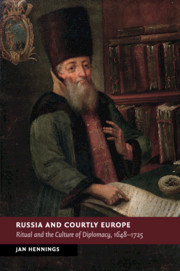Crossref Citations
This Book has been
cited by the following publications. This list is generated based on data provided by Crossref.
Sowerby, Tracey A.
2016.
Early Modern Diplomatic History.
History Compass,
Vol. 14,
Issue. 9,
p.
441.
Kamusella, Tomasz
2017.
The Un-Polish Poland, 1989 and the Illusion of Regained Historical Continuity.
p.
15.
Hennings, Jan
2018.
The Encyclopedia of Diplomacy.
p.
1.
Osborne, Toby
2018.
The Encyclopedia of Diplomacy.
p.
1.
Kardanova, Nataliya
2018.
Contributi italiani al XVI Congresso Internazionale degli Slavisti.
Vol. 40,
Issue. ,
p.
51.
Panov, Vladimir
2019.
Three Missions of Niclas Warkotsch to Moscow in 1589-1594 in the Light of Russian Diplomatic Ritual.
Opera Historica,
Vol. 20,
Issue. 1,
p.
7.
Kardanova, Nataliya
2019.
Il mondo slavo e l’Europa.
Vol. 43,
Issue. ,
p.
273.
Franklin, Simon
2019.
The Russian Graphosphere, 1450-1850.
Bogatyrev, Arseniy
2019.
The Prehistory of Innovations in The Russian Funeral Ceremony (Vasily M. Tyapkin at the Burial of Jan II Kazimierz and Michał Wiśniowiecki).
Slavic World in the Third Millennium,
Vol. 14,
Issue. 1-2,
p.
7.
Wang, Sixiang
2019.
Compiling Diplomacy: Record-Keeping and Archival Practices in Chosŏn Korea.
Journal of Korean Studies,
Vol. 24,
Issue. 2,
p.
255.
2020.
Confession and Politics in the Principality of Transylvania 1644–1657.
p.
259.
Abdurasulov, Ulfat
2020.
A Passage to India: Rhetoric and Diplomacy between Muscovy and Central Asia in the Seventeenth Century.
Itinerario,
Vol. 44,
Issue. 3,
p.
502.
Pert, Thomas
2021.
Pride and precedence: the rivalry of the House of Orange-Nassau and the Palatine family at the Anglo-Dutch wedding of 1641.
The Seventeenth Century,
Vol. 36,
Issue. 4,
p.
561.
Seitschek, Stefan
2022.
Influence and Politics at the Viennese court 1713-1748.
Studia Historica: Historia Moderna,
Vol. 44,
Issue. 2,
p.
227.
Amirell, Stefan Eklöf
2022.
New Diplomatic History and the Study of the Global Nineteenth Century.
Global Nineteenth-Century Studies,
Vol. 1,
Issue. 1,
p.
27.
Tolstikov, Alexander
2023.
Sweden, Russia, and the 1617 Peace of Stolbovo.
Vol. 14,
Issue. ,
p.
119.
Brundage, Jonah Stuart
2023.
Representation and Recognition: State Sovereignty as Performative.
American Journal of Sociology,
Vol. 128,
Issue. 5,
p.
1335.
Manin, D. O.
2023.
Development of the trade project and its role in Russian-french relations in the early 1680s.
History: facts and symbols,
Vol. 36,
Issue. 3,
p.
77.
Bruneau, Quentin
2023.
Rethinking International Order in Early Modern Europe: Evidence from Courtly Ceremonial.
International Organization,
Vol. 77,
Issue. 4,
p.
691.
Tremml-Werner, Birgit
2023.
The Elephant in the Archive: Knowledge Construction and Late Eighteenth-Century Global Diplomacy.
Itinerario,
Vol. 47,
Issue. 2,
p.
185.



